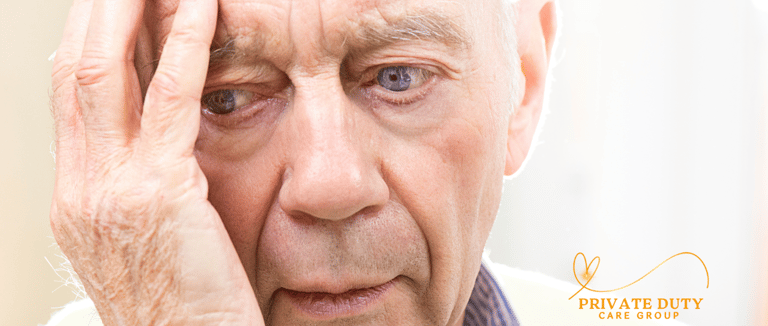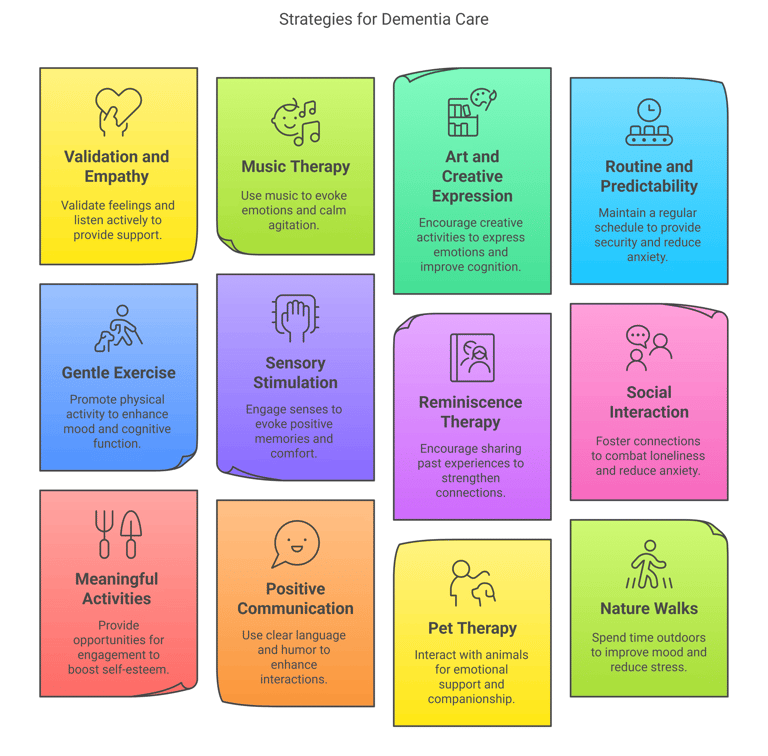Compassionate Caregiving Made Simple:
12 Proven Ways to Care for and Manage the Emotional and Mental State of Seniors with Dementia
Private Duty Care Group
3/6/20253 min read


Here are different ways to help a caregiver effectively help someone with Dementia.
1. Validation and Empathy: Always validate their feelings and experiences, even if they seem illogical. Listen actively and offer empathy, avoiding arguments or trying to correct their reality.
2. Music Therapy: Music can tap into deep emotions and memories, fostering positive connections and calming agitation. Encourage listening to familiar tunes or create personalized playlists.
3. Art and Creative Expression: Activities like painting, drawing, or sculpting provide an outlet for emotions and can improve cognitive function. Adapt activities to individual abilities and interests.
4. Routine and Predictability: Maintaining a regular schedule with familiar routines provides security and reduces anxiety. This includes consistent mealtimes, bedtimes, and activities.
5. Gentle Exercise and Physical Activities: Regular physical activity improves mood, cognitive function, and sleep. Adapt activities to individual capabilities; chair exercises, walks, or gardening can be beneficial.
6. Sensory Stimulation: Engage their senses through touch, smell, and taste. Provide calming textures, familiar scents, and favorite foods to evoke positive memories and comfort.
7. Reminiscence Therapy: Encourage reminiscing about past experiences through photos, music, or shared stories. This can spark joy, provide a sense of identity, and strengthen connections.
8. Social Interaction and Connection: Regular contact with loved ones and participation in social activities combat loneliness and isolation, reducing anxiety and depression. Encourage socialization within their comfort level.
9. Meaningful Activities and Purpose: Provide opportunities for engagement in meaningful activities, whether gardening, helping with chores, or volunteering. Feeling useful and contributing to their environment boosts self-esteem and reduces anxiety.
10. Positive Communication and Humor: Use concise language and avoid patronizing or infantilizing speech. Maintain an upbeat tone, incorporating humor where appropriate.
11. Pet therapy: Studies have shown that interacting with animals can provide emotional support, reduce loneliness, and alleviate symptoms of depression in individuals with dementia. Consider adopting a pet or visiting animal shelters with your loved one, ensuring compatibility and safety considerations are addressed.
12. Nature walks and outdoor time: Spending time in nature can significantly reduce stress and anxiety, improve mood, and enhance cognitive function. Take your loved one for quiet walks, visit gardens, or enjoy the fresh air and sunshine outdoors.
Bonus Tip: Educate yourself about dementia and understand the specific challenges your loved one faces. Seek professional guidance and support from healthcare providers and dementia care specialists.
Consistency and patience are key when caring for someone with dementia. These additional tips can enhance their emotional and mental well-being, creating a more positive and supportive environment for everyone involved.
Every individual with dementia is unique, and their needs and responses to different approaches will vary. Be patient and flexible, and celebrate even small successes. These evidence-based and experience-informed strategies can offer practical ways to manage the emotional and mental state of seniors with dementia and contribute to their overall well-being.
Nature walks and outdoor time: Spending time in nature can significantly reduce stress and anxiety, improve mood, and enhance cognitive function. Take your loved one for quiet walks, visit gardens, or enjoy the fresh air and sunshine outdoors.


Concise Legal Disclosure
The content on this blog, including articles about natural supplements, holistic healthcare, disease prevention, and alternative treatments, is provided for informational purposes only and should not be considered professional medical advice. Always consult a qualified healthcare professional before making health-related decisions. The writer, publisher, and affiliates are not liable for any damages arising from the use of this content.
For full details, including indemnification and terms for third-party content, please see our Full Legal Disclosure.
Share Responsibly: Inspire others with holistic health insights, but always encourage professional guidance!
Independence in Practice
"Connect with High-Net-Worth Clients By Joining Our Elite Registry "
Leave A Text Message
Private Duty Nurse, Adult/Senior Caregiver, Nanny
admin@privatedutycaregroup.com
+1-914-207-5324
© 2024. Private Duty Care Group.
All rights reserved.


